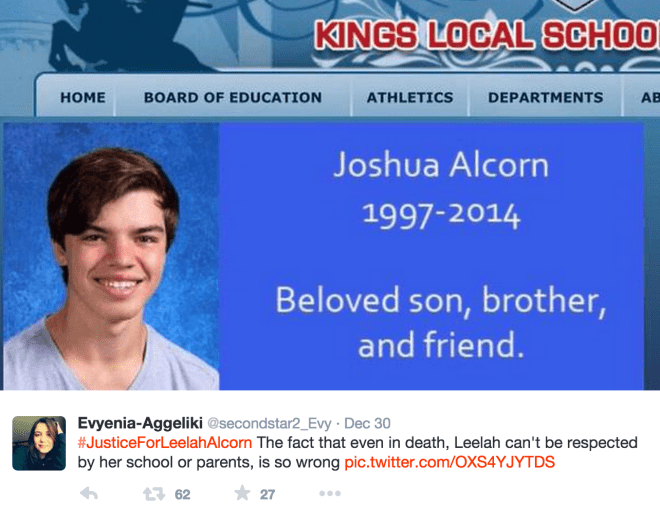A reader focuses the Dish discussion:
There’s a pretty basic point that may deserve explicit mention. A major purpose of puberty-blocking drugs, in particular, is to DELAY the moment of decision until one is prepared to decide. One can discontinue these drugs and undergo puberty later on, with no further intervention. I understand fully why people would be worried about young children making complex irrevocable decisions about their own well-being. What I can’t understand is why those people are against puberty-delaying drugs, rather than being fervent advocates!
Here’s a helpful NPR interview of two doctors who specialize in these issues. Money quote:
How long do you use the hormone blockers to suppress puberty?
Until around 16. Then you use the cross hormones to bring on the characteristics of the opposite sex. And remember, if you just stop the hormone blockers at 16, the person will go right back to genetic puberty within months. So the beauty of the suppressant is not as a treatment but for prolonging the evaluation phase … ’til a young person has greater ability for abstract reasoning. It buys you time without a tremendous fear of their body getting out of control.
That interview was from 2008. From September:
[A] new study finds that the results of such treatments are very positive. … Lead Author Dr. Annelou de Vries explained to CBS News that puberty suppression is a “fully reversible medical intervention” and the extra time allows the young people to work out their struggles related to gender dysphoria before taking permanent steps toward a transition.
Back to the in-tray:
I think many readers are missing Leelah’s point regarding appearance. The question is not attractive versus unattractive, but rather being “visibly trans” versus “not-visibly trans.”
Transitioning early does not ensure you look like Cindy Crawford, to utilize the example of one reader. Rather, it helps to ensure that the transgender person is not thrust into a life where merely walking down the street threatens their physical safety. A trans woman was stabbed on a bus in San Francisco the other day while simply minding her own business – all because the perpetrator (correctly) assumed she was trans from her appearance. In a perfect world, “looking trans” wouldn’t be a problem, wouldn’t lead to violence or discrimination – but it does. To subject a person to a life with that type of physical and economic hardship because of an abstract point about beauty is cruel.
And again, early transitioners aren’t guaranteed “beauty.” And it’s not nearly as superficial as some readers suggest – quite the contrary. Additionally, the mere outset of puberty and the ensuing physical reactions (body hair, lowering of voice) induces the medically demonstrable experience of gender dysphoria. Denial of access to transition related medical care is a leading contributor to suicide, not merely because of the potential long-term consequences outlined above, but because the real-time denial of an identity is emotionally traumatic for transgender people.
Puberty blockers are reversible, but, even still, are only prescribed after a thorough medical process, extended gender identity assertion, and conversations between parents, children, and their doctors. That’s why this process is quickly becoming the medically and psychologically recommended course. I understand the initial negative gut reaction to allowing a child to transition genders. It seems like a big step, and kids are fickle, after all. Indeed, I’m sure many of the parents who eventually let their kids transition initially feel that way. People are obviously entitled to their own opinions, but not their own facts. The facts, and, thus the growing medical consensus, is on the side of allowing children to transition.
Update from a reader:
I have been wanting to share my experience (and my partner’s) on this topic for some time. We are both lesbians. We are both very comfortable with our gender. When we were growing up, however, we both wanted to be boys. We dressed like boys. We played mostly with boys. We always chose to play the boy role. It wasn’t until puberty that those feelings changed. I am not sure why that was, but they did. We no longer wanted to be boys. All this is to say that blocking/delaying puberty, which for me, and other lesbians I know, changed the way we felt about ourselves, isn’t risk free.
Another:
Your reader describes how she and her female partner both “wanted to be boys” until puberty, and then got comfortable being females. It may not be possible to know for sure, but this sounds very different from the transgender experience. I do not hear about such people “wanting to be boys” (or girls) as children, but always as insisting that they are boys (or girls). That seems like a fundamental difference.
Another notes:
This entire discussion reminds me again of why I’m so grateful you curate comments for discussion of a topic, rather than have an open comments section. I’ve never seen anything like he cesspool that is the Leelah thread going on at Datalounge. I have no doubt this is what a Dish “comments section” would look like right now if one existed, not because most of your readers share these views (or most Dataloungers share these views), but because this is how it always goes with open comment sections on hot button topics. The rational and reasonable on all sides of a debate flee in droves because of the vitriol, and then the bottom feeders really take over, racing to outdo each other in saying the most repulsive things about each other and people like Leelah.




